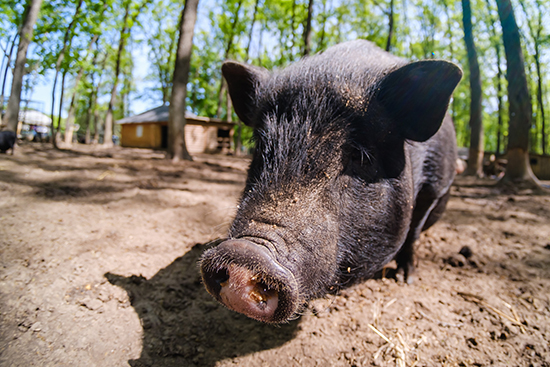In the province of Drenthe a number of pig farmers are making their animals useful before they go to slaughter. The pigs live outside, so they can be used on the fields for the management of forests and farming, bringing a variety of benefits. The Netherlands is known around the world for its intensive pig farming and multi-storey ‘pig flats’. Seeing them outside is so rare that the animals have become a kind of tourist attraction, as Dutch media have recently reported.
Double goal
One of the farmers, Willem Hempen, bases his company Akkervarken (Field Pig) on what he calls a ‘double goal’ philosophy. Before his pigs, from Berkshire, Duroc and Husumer breeds, end up as a ‘good piece of meat’, they must make themselves useful in a natural way. Hempen referred calls his animals ‘small agricultural machines on legs’. According to him, whatever crazy thing you think of, you can use pigs for it.
Soil cleaners
To begin with, pigs kept this way will ensure the fields are thoroughly cleaned of weeds after the harvest, so that farmers will not have to resort to glyphosate or other poisons. Hempen also explained that the animals do their job thoroughly: “Recently I received a call from a farmer who said: they are digging up to a meter deep. It turned out that a weed called peat root was growing there.” Pigs like some plant and weed species that are known for being invasive, and while some Dutch municipalities are struggling to, for example, combat Japanese knotweed by injecting or electrocuting hot water into the roots, Hempen has been using his animals for years in a much more effective way. Since his pigs are allowed to consume potato leftovers, they can also help avoid crop-destroying potato blight. In a similar light, on a forest plot near Roderesch in Drenthe, a bunch of winter-hardy Mangalitsa Hungarian pigs owned by ‘wild’ pig farmer Hans Wilpstra of Ecolife Natuurvlees are taking care of proliferating blackberry scrubs, which are known to deprive other plant species of space.
Meanwhile in another part of Drenthe, the outdoor pigs of Maarten Jansen, founder of the Mangalicahof, are also busy improving soil. Jansen is a ‘primal farmer’ who keeps the Mangalitsa breed and other animals in more natural ways. Mating too occurs naturally, and, says Jansen, as long as there is enough space, the animals themselves ensure that things go well. Their digging stimulates composting, enabling the pigs to be systematic cleaners of farm land.
Improved taste and health
There are also additional health and taste benefits derived from meat reared this way. Wilpstra, whose forest pigs eat wild acorns, said: “You taste what they eat in these animals; acorns give their meat a darker taste.” At the Mangalicahof, the meat from Jansen’s biodynamic company is also known for an improved taste, and ‘improved composition of healthy unsaturated fatty acids’. Mangalicahof produces dry hams and sausages, which are sent throughout the country and even into Germany and France, and appreciated by first-rate chefs. An animal needs time to grow, and when animals are able to forage and root for food, says the company, which ‘after all is how they have developed through evolution’, their meat becomes tasty and tender.
Strange sight
There are other initiatives in the Netherlands, such as Buitengewone Varkens (Extraordinary Pigs), a company whose outdoor pigs are spread across the Netherlands in twelve locations, but keeping pigs this way remains a rare sight. When Hempen deployed his pigs as landscape managers for his first job, on a green strip that was overgrown with giant hogweed, he learned this first-hand: even the relevant government department told him there are no guidelines for keeping pigs in this way. This also means that finding land for the animals to root on is not easy. Wilpstra says he has had to lobby to find space for his animals. But now, increased demand means he has to disappoint landowners, since he does not have enough animals for all owners who want to benefit from the advantages of pigs.
Written by Femke van Iperen
